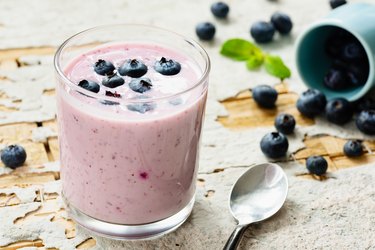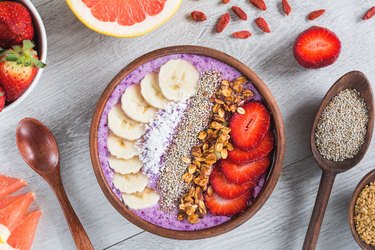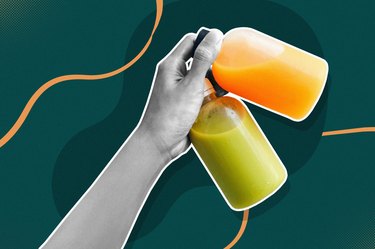
As anyone who has broken a fast will tell you, going about it the wrong way can cause stomach upset, making you feel bloated, uncomfortable and lethargic.
If you want to avoid that unpleasant possibility, what are the best foods to eat after fasting?
Video of the Day
Video of the Day
Not just any food or beverage will do after many hours without eating. Here are some things that are good for your body to eat and drink (along with some to avoid).
Best Foods and Drinks to Have After a Fast
1. Fluids
During your fast, it's advised you drink plenty of water, per the British Nutrition Foundation. And, as you end your fast, focus on beverages like milk, fruit juices or blended drinks like smoothies.
These drinks tend to be a gentle way of getting your body some nutrition — they contain copper, manganese, potassium and fiber — without overloading the digestive process.
That said, try to avoid sugar-heavy drinks. Many types of sugars, including fructose, which is used as a sweetener in juice and soda, can lead to gas, per the International Foundation for Gastrointestinal Disorders.
2. Dried Fruit
During Ramadan, dates are often eaten to break the fast, per the British Nutrition Foundation. Along with being traditional, they're a good source of carbohydrates and micronutrients — a single date has 18 grams of carbohydrates, per the USDA.
Other dried fruits that provide carbs and fiber, like dried apricots or raisins, are good fast-breaking foods as well.
3. Soup
Brothy soups are another food that helps to keep you hydrated.
And when breaking a fast, look for soups that have protein (via lentils, beans, meat or poultry for staying power until your next meal) and carbs, like pasta or rice, for quick energy.
Tip
Fasting doesn’t mean that when you eat, it's a free-for-all. You should keep your post-fast meals nutritious, too, per Harvard Health Publishing. Eat fruits, vegetables, whole grains, beans and lentils, healthy fats and lean protein.
Can You Eat Meat After Fasting?
Yes, eating meat or other protein-rich foods after fasting is actually recommended, per the British Nutrition Foundation. Depending on the length of your fast, you may want to aim to eat smaller portions.
However, you should limit the fatty foods you eat, so lean meat (such as skinless chicken and turkey) is preferable. This is because you want to maximize the nutrition you take in when you're limiting the time window where you can eat, according to the British Nutrition Foundation.
How Long Should You Fast?
How long to fast before breaking your fast really depends on the diet you're following. Some common intermittent fasting diets include:
- Time-restricted fasting, meaning food is eaten within a limited number of hours (such as 6, 8 or 12 hours) — and nothing is consumed outside of that time block. An example of this is 16:8 fasting, where you eat during eight hours of the day, and fast for the remaining 16.
- Alternate day fasting — that is, every other day you consume minimal or no calories
- Periodic fasting, where you restrict your intake for a short stretch of time, such as five days every month
- 5:2 fasting, where you eat as usual for five days, then restrict calories heavily for two days
But fasting isn't just a fad diet — it's also been around for years as a religious tradition.
Ramadan is one such religious fasting event: Muslims don't eat or drink anything between sunrise and sunset during the ninth month of the Islamic calendar. It's also a time for spiritual reflection and prayer.
The same goes for Yom Kippur, the holiest day in the Jewish faith, and also a 26-hour period where Jews abstain from eating and drinking (among a short list of other things) in late September.
What Fasting Does to Your Body
These religious fasting traditions have actually spurred much interest in the health effects of fasting, as well as provided data for researchers. Energy balance, quelling cell and tissue damage from free radicals and lowering blood lipids, are all noted benefits of fasting, according to a March 2017 review published by Nutrition.
But during a fast, your body eats up its stores of carbohydrates and fat to fuel your body. If you're not drinking water (which is the case for some religious fasts), your kidneys hold on to water, and it's likely that you'll experience some mild dehydration, per the British Nutrition Foundation.
Does Fasting Help With Weight Loss?
It's still unclear if fasting is beneficial for weight loss, according to the Academy of Nutrition and Dietetics.
There's research that supports intermittent fasting for weight loss, per a July 2017 review in the Annual Review of Nutrition. But the science isn't all that clear cut: Among the three main fasting types (alternate day fasting, modified fasting and time-restricted fasting), there doesn't appear to be a significant difference in weight loss between fasting and low-calorie diets, per the Academy.
And there can be a downside to fasting. It can be particularly harmful to people with a history of disordered eating, those who have diabetes and folks who are pregnant or breastfeeding. Hunger pains, trouble focusing and overeating were reported with fasting.
For weight loss, and as a form of dieting, fasting is not recommended by the Academy of Nutrition and Dietetics.
- British Nutrition Foundation: "A Healthy Ramadan"
- Harvard Health Publishing: "Intermittent Fasting: A Surprising Update"
- EatRight.org: "What Is Intermittent Fasting?"
- Nutrition: "Unraveling the Metabolic Health Benefits of Fasting Related to Religious Beliefs: A Narrative Review"
- Annual Review of Nutrition: "Metabolic Effects of Intermittent Fasting"
- International Foundation for Gastrointestinal Disorders: "Foods that May Cause Gas"
Is this an emergency? If you are experiencing serious medical symptoms, please see the National Library of Medicine’s list of signs you need emergency medical attention or call 911.


